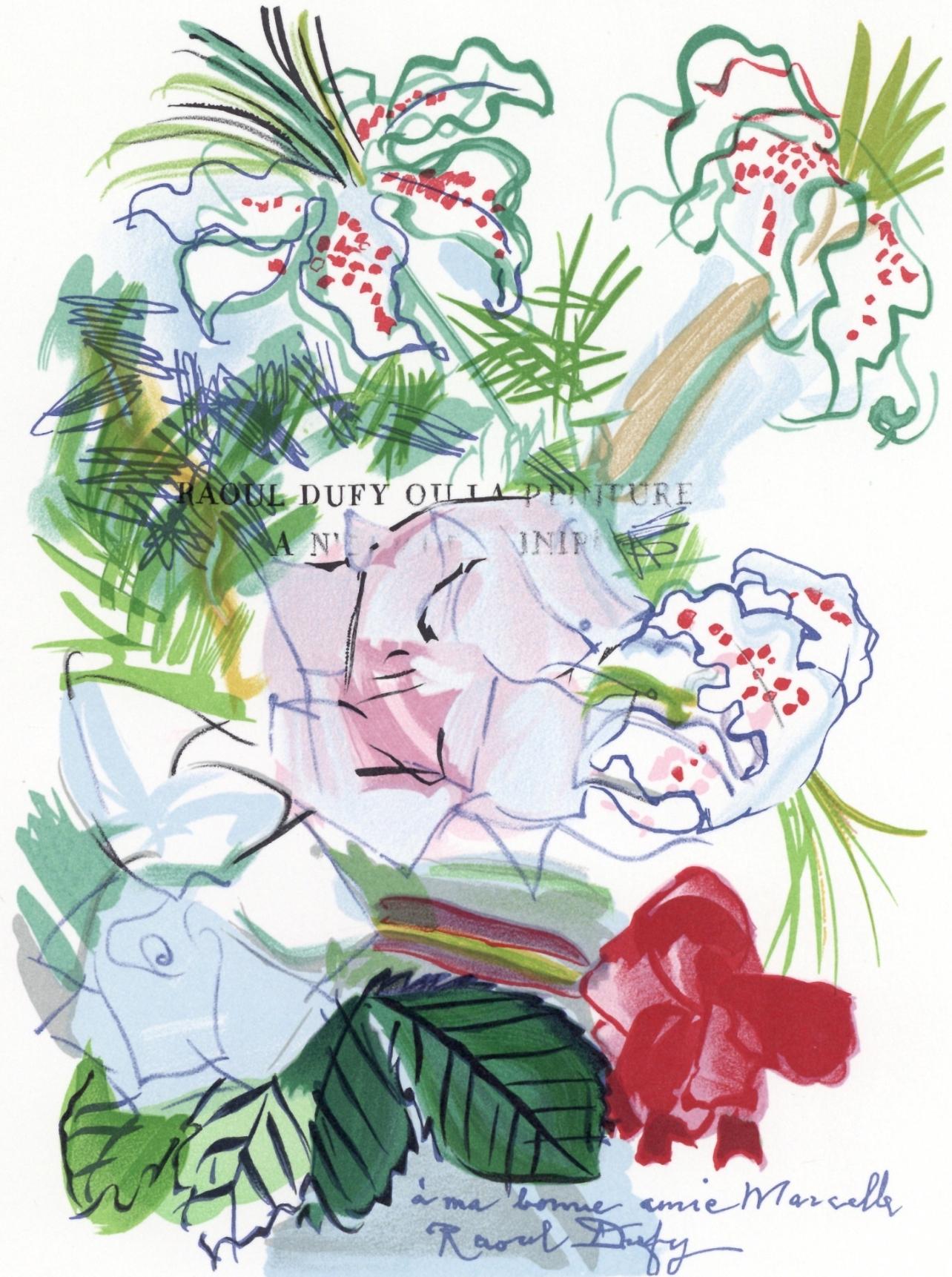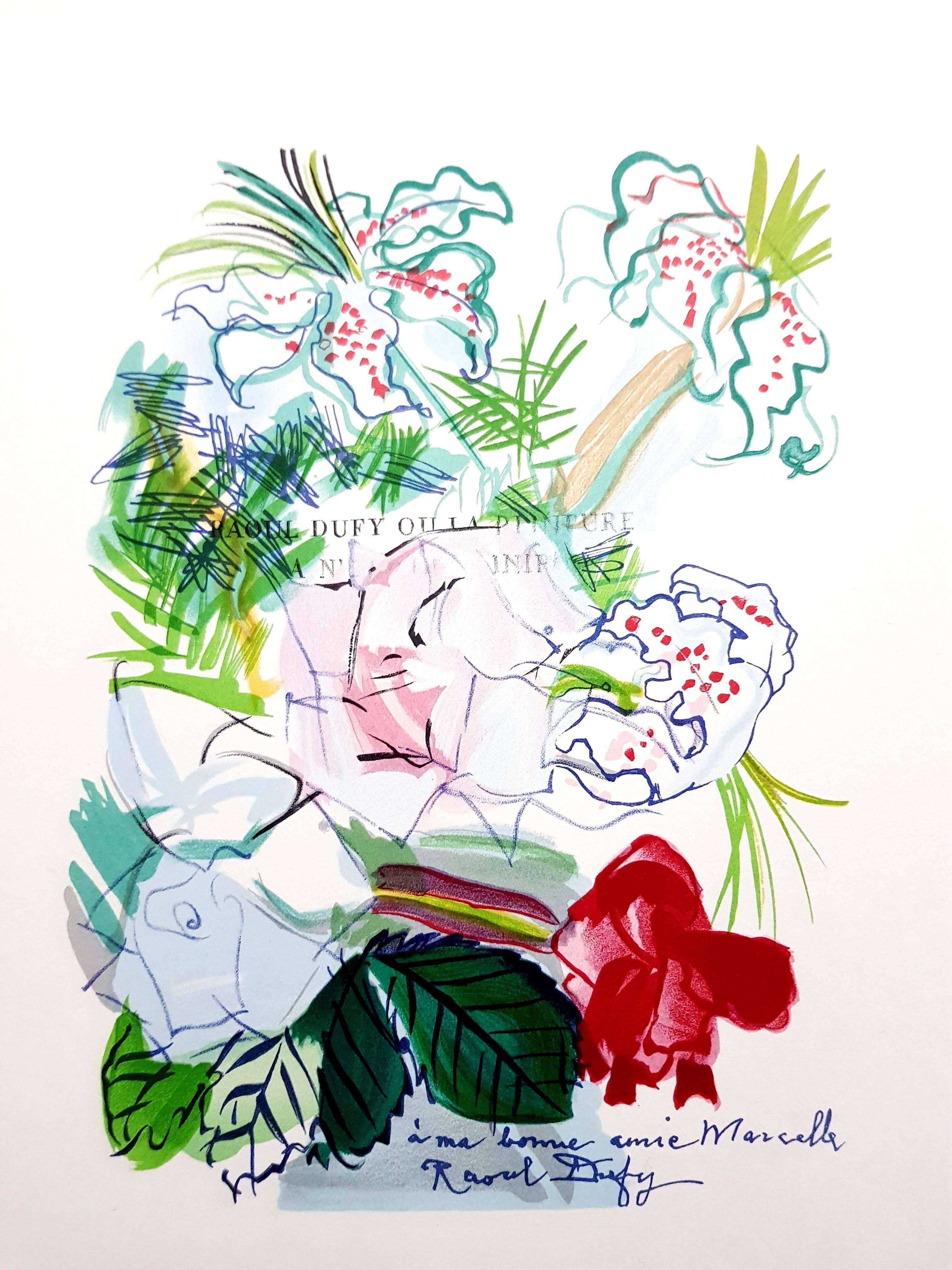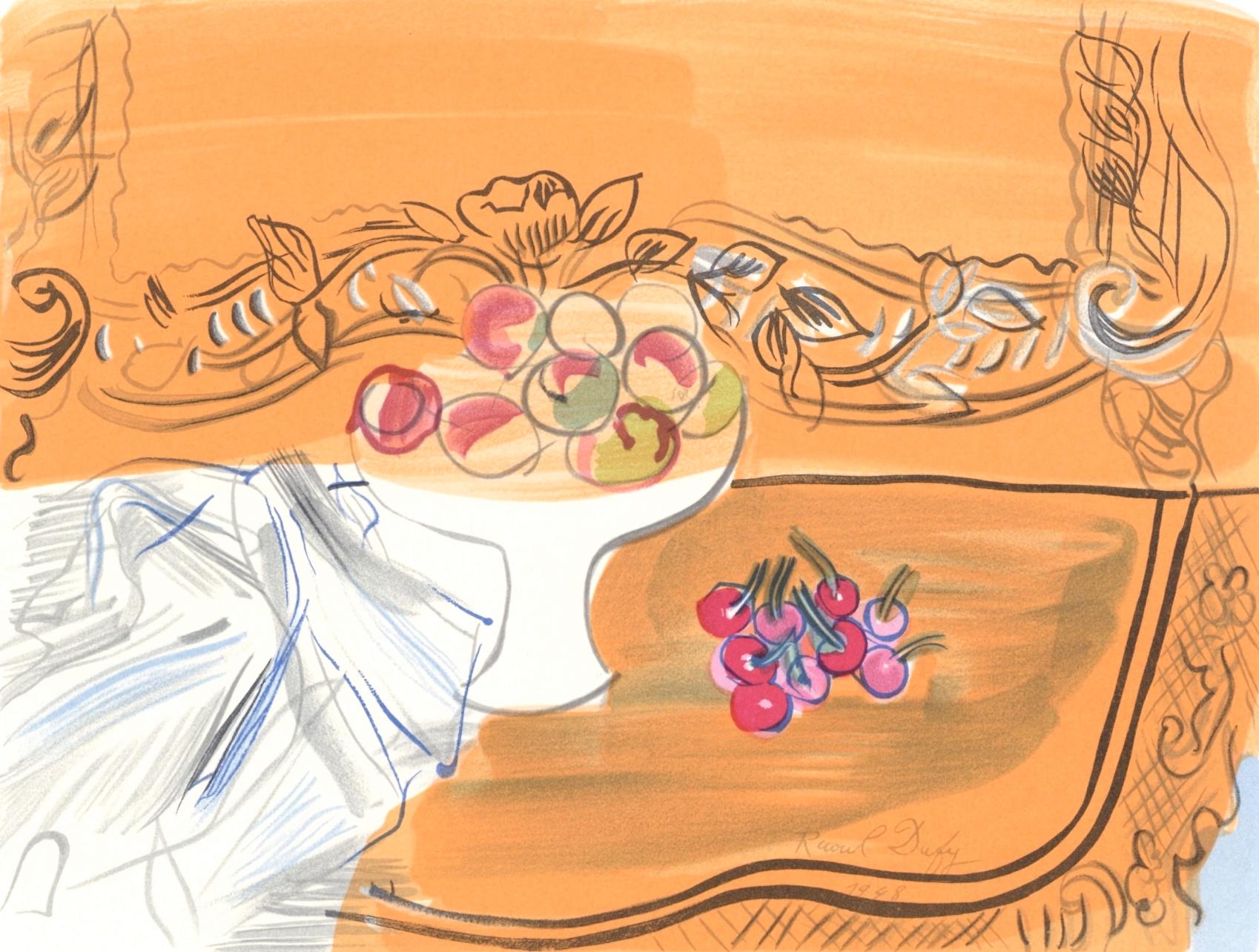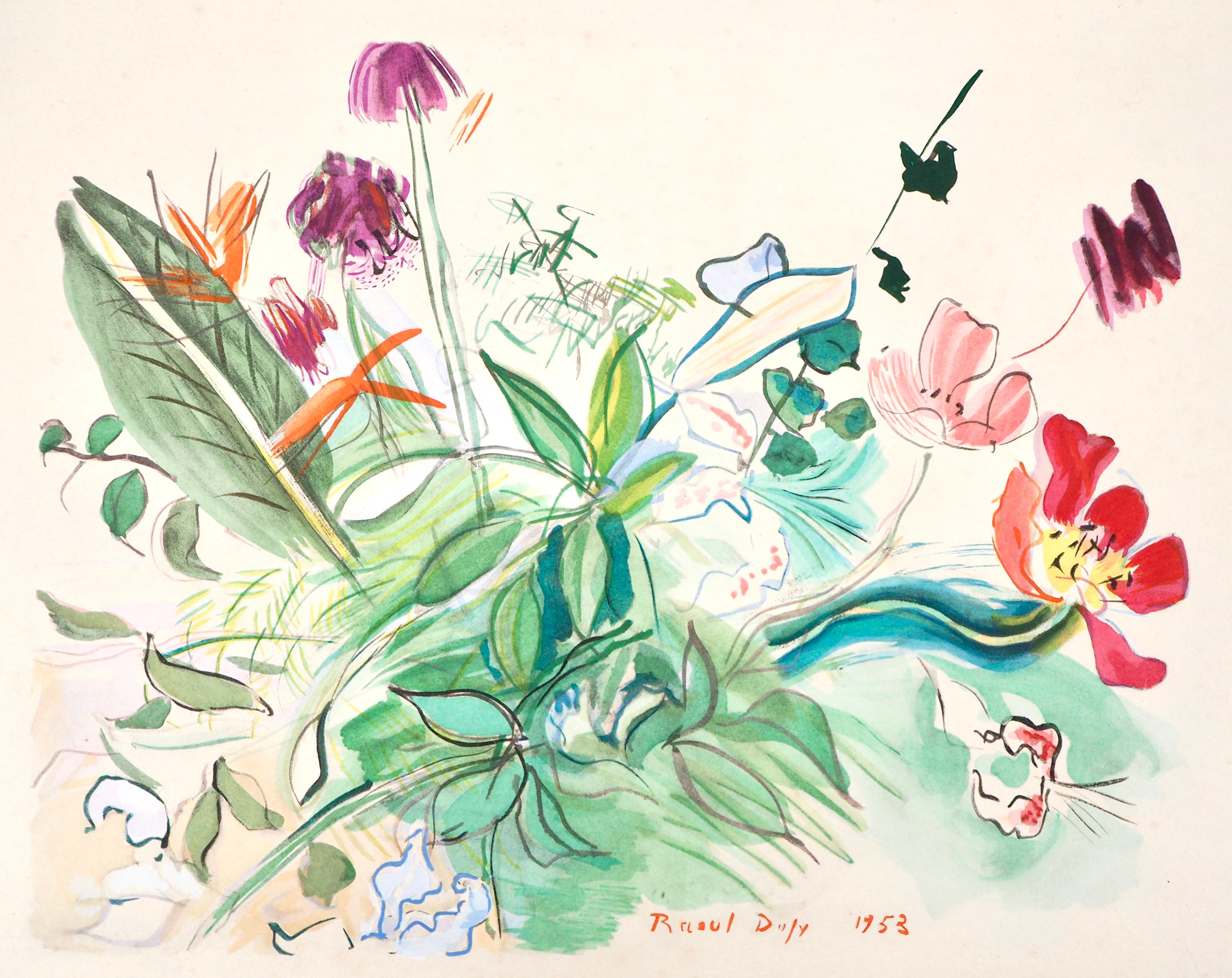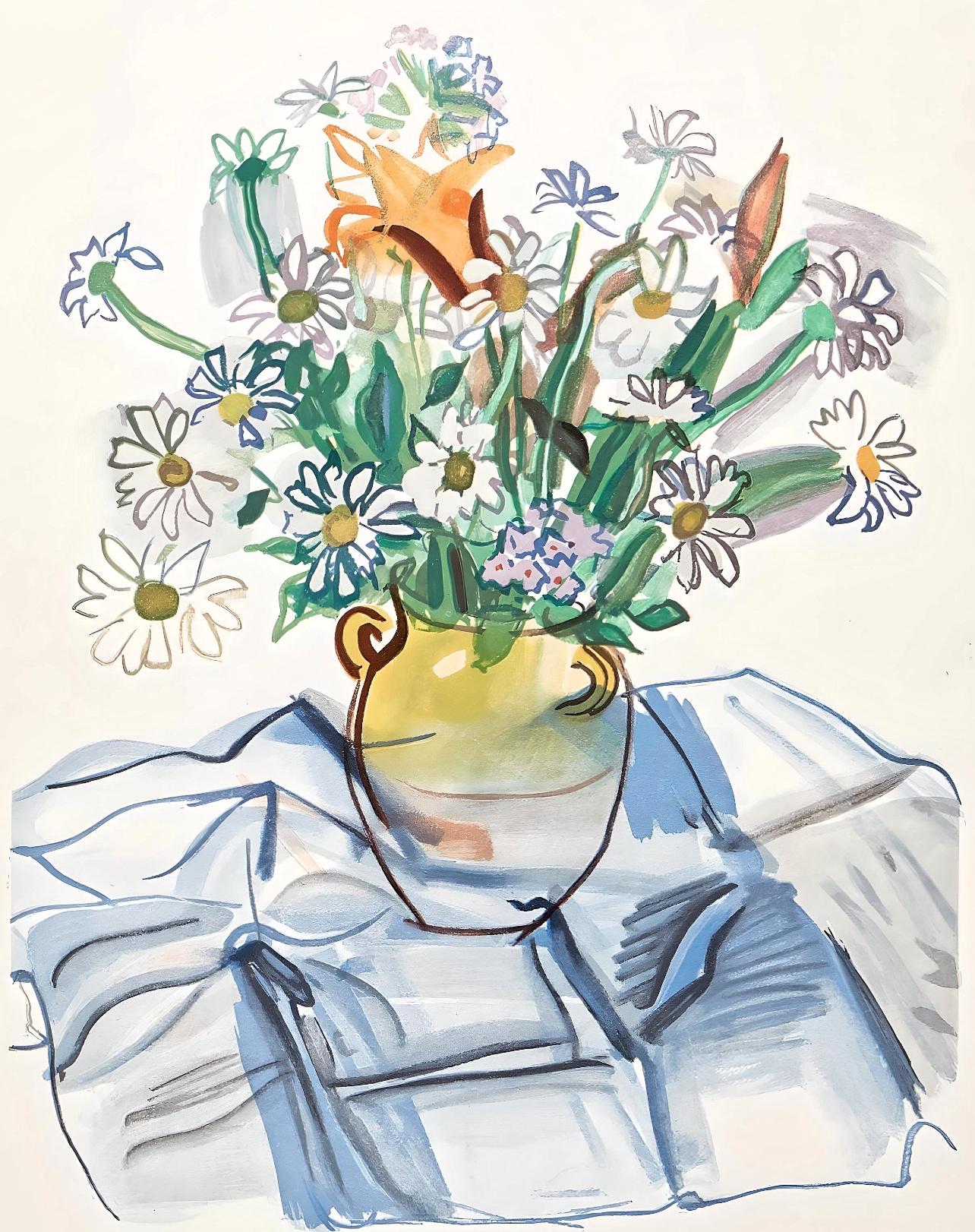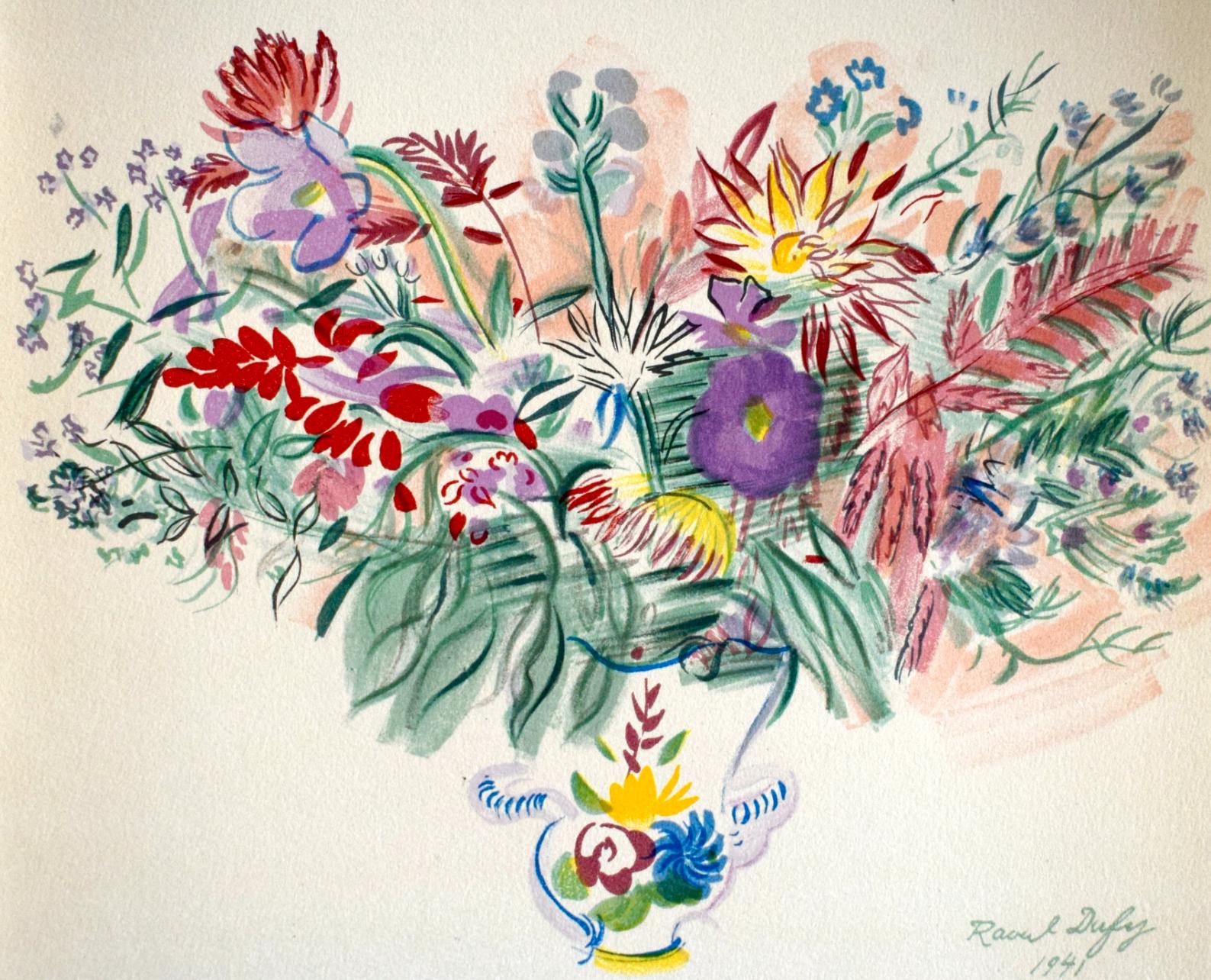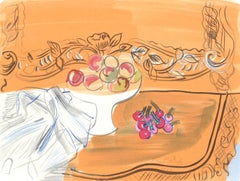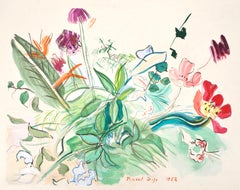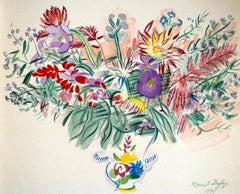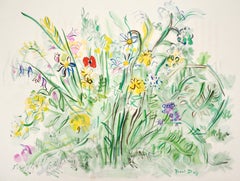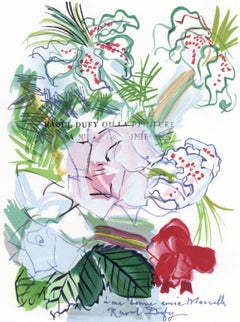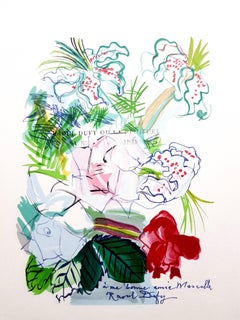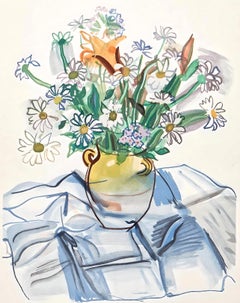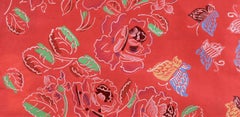Items Similar to Dufy, Fleurs peintes, Lettre à mon peintre Raoul Dufy (after)
Want more images or videos?
Request additional images or videos from the seller
1 of 9
Dufy, Fleurs peintes, Lettre à mon peintre Raoul Dufy (after)1965
1965
$716
$89520% Off
£539.66
£674.5820% Off
€623.75
€779.6920% Off
CA$1,011.70
CA$1,264.6320% Off
A$1,105.83
A$1,382.2920% Off
CHF 582.41
CHF 728.0220% Off
MX$13,597.24
MX$16,996.5420% Off
NOK 7,278.56
NOK 9,098.2120% Off
SEK 6,847.69
SEK 8,559.6220% Off
DKK 4,656.70
DKK 5,820.8820% Off
About the Item
Lithograph on vélin Arjomari paper. Paper Size: 11.75 x 9.375 inches. Inscription: Signed in the plate and unnumbered, as issued. Notes: From the folio, Lettre à mon peintre Raoul Dufy, 1965. Published by Librairie académique Perrin et Cie, Paris; printed by Mourlot Frères, Paris, July 22, 1965. Excerpted from the album (translated from French), The typography of this album was completed to print at L'Imprimerie nationale, Monsieur André Brignole as Director and Paul Lajun as head of typography. The type-set was made with the Garamont corps 20, exclusive property of the grand Établissement d'État on the presses of which the printing was completed on July 22, 1965. The color lithographs and black drawings as well as the manuscripts were shot on Fernand Mourlot's presses. Henri Jadoux was the assistant responsible for the project. It was taken from this edition, XXV examples on vélin B.F.K. de Rives, numbered from I to XXV, accompanied by a suite of lithographs and an original etching signed by Jacques Villon, CMLXXV examples on vélin B.F.K. de Rives, numbered from XXVI to M, accompanied by a series of lithographs, and V̅ examples on vélin Arjomari, numbered from MI to V̅I̅, and finally, CC examples, hors commerce.
RAOUL DUFY (1877-1953) was a French painter associated with the Fauvist movement. He gained recognition for his vibrant and decorative style, which became popular in various forms, such as textile designs, and public building decorations. Dufy is most remembered for his artwork depicting outdoor social gatherings. In addition to painting, he was skilled in various other fields, including drawing, printmaking, book illustration, scenic design, furniture design, and planning public spaces. In 2007, Raoul Dufy's painting, La Foire aux Oignons, sold for $7,941,112 at Sotheby's London, setting a world record for the artist.
- Creation Year:1965
- Dimensions:Height: 11.75 in (29.85 cm)Width: 9.375 in (23.82 cm)
- Medium:
- Movement & Style:
- After:Raoul Dufy (1877-1953, French)
- Period:
- Condition:
- Gallery Location:Southampton, NY
- Reference Number:1stDibs: LU1465216687882
About the Seller
4.9
Platinum Seller
Premium sellers with a 4.7+ rating and 24-hour response times
Established in 1978
1stDibs seller since 2021
1,183 sales on 1stDibs
Typical response time: <1 hour
- ShippingRetrieving quote...Shipping from: Southampton, NY
- Return Policy
Authenticity Guarantee
In the unlikely event there’s an issue with an item’s authenticity, contact us within 1 year for a full refund. DetailsMoney-Back Guarantee
If your item is not as described, is damaged in transit, or does not arrive, contact us within 7 days for a full refund. Details24-Hour Cancellation
You have a 24-hour grace period in which to reconsider your purchase, with no questions asked.Vetted Professional Sellers
Our world-class sellers must adhere to strict standards for service and quality, maintaining the integrity of our listings.Price-Match Guarantee
If you find that a seller listed the same item for a lower price elsewhere, we’ll match it.Trusted Global Delivery
Our best-in-class carrier network provides specialized shipping options worldwide, including custom delivery.More From This Seller
View AllDufy, Nature morte, Lettre à mon peintre Raoul Dufy (after)
By Raoul Dufy
Located in Southampton, NY
Lithograph on vélin Arjomari paper. Paper Size: 11.75 x 9.375 inches. Inscription: Signed in the plate and unnumbered, as issued. Notes: From the folio, Lettre à mon peintre Raoul Du...
Category
1960s Fauvist Figurative Prints
Materials
Lithograph
$716 Sale Price
20% Off
Free Shipping
Dufy, Composition, Eaux-de-vie, Esprit de la fleur et du fruit (after)
By Raoul Dufy
Located in Southampton, NY
Lithograph and stencil on vélin d’Arches paper. Unsigned and unnumbered, as issued. Good condition. Published and printed by Bernard Klein, éditeur, Paris, February 26, 1954. Notes: ...
Category
1950s Modern Landscape Prints
Materials
Stencil, Lithograph
Dufy, Composition, Les Peintres mes amis (after)
By Raoul Dufy
Located in Southampton, NY
Lithograph on vélin d’Arches paper. Unsigned and unnumbered, as issued. Good condition. Notes: From the folio, Les Peintres mes amis, 1965. Published by Éditions d'art Les Heures Cla...
Category
1960s Modern Landscape Prints
Materials
Lithograph
Dufy, Composition, Eaux-de-vie, Esprit de la fleur et du fruit (after)
By Raoul Dufy
Located in Southampton, NY
Lithograph and stencil on vélin d’Arches paper. Unsigned and unnumbered, as issued. Good condition. Published and printed by Bernard Klein, éditeur, Paris, February 26, 1954. Notes: ...
Category
1950s Modern Landscape Prints
Materials
Lithograph, Stencil
$1,196 Sale Price
20% Off
Free Shipping
Sans titre, Lettre à mon peintre Raoul Dufy
By Charles Lapicque
Located in Southampton, NY
Lithograph on vélin Arjomari paper. Paper Size: 11.75 x 9.375 inches. Inscription: Signed in the plate and unnumbered, as issued. Notes: From the folio, Lettre à mon peintre Raoul Du...
Category
1960s Modern Figurative Prints
Materials
Lithograph
$716 Sale Price
20% Off
Free Shipping
Dufy, Sans titre, Lettre à mon peintre Raoul Dufy (after)
By Raoul Dufy
Located in Southampton, NY
Lithograph on vélin Arjomari paper. Paper Size: 11.75 x 18.75 inches, with centerfold, as issued. Inscription: Signed in the plate and unnumbered, as issued. Notes: From the folio, L...
Category
1960s Fauvist Figurative Prints
Materials
Lithograph
You May Also Like
Dufy, Fleurs peintes en manière, Lettre à mon peintre Raoul Dufy (after)
By Raoul Dufy
Located in Fairfield, CT
Medium: Lithograph on vélin d'Arches Arjomari paper
Year: 1965
Paper Size: 11.81 x 9.45 inches
Inscription: Signed in the plate and unnumbered, as issued
Notes: From the folio, Lettr...
Category
1960s Modern Landscape Prints
Materials
Lithograph
$876 Sale Price
20% Off
Composition - Lithograph
By (after) Raoul Dufy
Located in Collonge Bellerive, Geneve, CH
(after) Raoul Dufy
Lithograph after a watercolor, published in the book "Lettre à mon peintre Raoul Dufy." Paris, Librairie Académique Perrin, 1965.
Printed signature
Di...
Category
1940s Fauvist Animal Prints
Materials
Lithograph
Dufy, Bouquet, Vacances forcées (after)
By Raoul Dufy
Located in Fairfield, CT
Medium: Lithograph on papier bouffant des Papeteries de Casteljoux paper
Year: 1970
Paper Size: 12 x 9.25 inches
Inscription: Unsigned and unnumbered, as issued
Notes: From the folio...
Category
1970s Modern Landscape Prints
Materials
Lithograph
$716 Sale Price
20% Off
Fleurs et Papillons - Fauvist Flowers Watercolor & Gouache by Raoul Dufy
By Raoul Dufy
Located in Marlow, Buckinghamshire
Botanical watercolour and gouache on paper circa 1920 by French fauvist painter Raoul Dufy. The work depicts flowers in red and butterflies in blues, yellows, black and white. This work was executed by Dufy as a fabric design.
Dimensions:
Framed: 17"x27"
Unframed: 10"x20"
Provenance:
Private collection of works by Raoul Dufy for Bianchini Ferier
Bianchini Ferrier Collection - Christie's London - July 2001
SF Fall Show
Raoul Dufy was one of a family of nine children, including five sisters and a younger brother, Jean Dufy, also destined to become a painter. Their father was an accountant in the employ of a major company in Le Havre. The Dufy family was musically gifted: his father was an organist, as was his brother Léon, and his youngest brother Gaston was an accomplished flautist who later worked as a music critic in Paris. Raoul Dufy's studies were interrupted at the age of 14, when he had to contribute to the family income. He took a job with an importer of Brazilian coffee, but still found time from 1892 to attend evening courses in drawing and composition at the local college of fine arts under Charles Marie Lhullier, former teacher of Othon Friesz and Georges Braque. He spent his free time in museums, admiring the paintings of Eugène Boudin in Le Havre and The Justice of Trajan in Rouen. A municipal scholarship enabled him to leave for Paris in 1900, where he lodged initially with Othon Friesz. He was accepted by the École des Beaux-Arts, where he studied under Léon Bonnat, whose innate conservatism prompted Dufy to remark later that it was 'good to be at the Beaux-Arts providing one knew one could leave'.
And leave he did, four years later, embarking with friends and fellow students on the rounds of the major Paris galleries - Ambroise Vollard, Durand-Ruel, Eugène Blot and Berheim-Jeune. For Dufy and his contemporaries, Impressionism represented a rejection of sterile academism in favour of the open-air canvases of Manet, the light and bright colours of the Impressionists, and, beyond them, the daringly innovative work of Gauguin and Van Gogh, Seurat, Cézanne, Toulouse-Lautrec and others. Dufy was an out-and-out individualist, however, and was not tempted to imitate any of these artists. He produced, between 1935 and 1937, Fée Electricité (Spirit of Electricity), the emblem for the French utilities company Electricité de France (EDF).
Dufy visited the USA for the first time in 1937, as a member of the Carnegie Prize jury. In 1940, the outbreak of war (and his increasingly rheumatic condition) persuaded him to settle in Nice. When he eventually returned to Paris 10 years later, his rheumatism had become so debilitating that he immediately left for Boston to follow a course of pioneering anti-cortisone treatment. He continued working, however, spending time first in Harvard and then in New York City before moving to the drier climate of Tucson, Arizona. The cortisone treatment was by and large unsuccessful, although he did recover the use of his fingers. He returned to Paris in 1951 and decided to settle in Forcalquier, where the climate was more clement. Within a short time, however, he was wheelchair-bound. He died in Forcalquier in March 1953 and was buried in Cimiez.
Between 1895 and 1898, Raoul Dufy painted watercolours of landscapes near his native Le Havre and around Honfleur and Falaise. By the turn of the century, however, he was already painting certain subjects that were to become hallmarks of his work - flag-decked Parisian cityscapes, Normandy beaches teeming with visitors, regattas and the like, including one of his better-known early works, Landing Stage at Ste-Adresse. By 1905-1906 Friesz, Braque, Matisse, Derain, Vlaminck, Van Dongen and Rouault were described collectively as Fauves (the wild beasts). What they had in common was a desire to innovate, but they felt constrained nonetheless to meet formally to set out the guiding principles of what promised to be a new 'movement'. Dufy quickly established that those principles were acceptable; moreover, he was most impressed by one particular painting by Henri Matisse ( Luxury, Calm and Voluptuousness) which, to Dufy, embodied both novelty and a sense of artistic freedom. Dufy promptly aligned himself with the Fauves. Together with Albert Marquet in particular, he spent his time travelling the Normandy coast and painting views similar...
Category
1920s Fauvist Still-life Drawings and Watercolors
Materials
Paper, Watercolor, Gouache
Dufy, Nature morte, Lettre à mon peintre Raoul Dufy (after)
By Raoul Dufy
Located in Fairfield, CT
Medium: Lithograph on vélin d'Arches Arjomari paper
Year: 1965
Paper Size: 11.81 x 9.45 inches
Inscription: Unsigned and unnumbered, as issued
Notes: From the folio, Lettre à mon pei...
Category
1960s Modern Landscape Prints
Materials
Lithograph
$716 Sale Price
20% Off
Lapicque, Composition, Lettre à mon peintre Raoul Dufy (after)
By Charles Lapicque
Located in Fairfield, CT
Medium: Lithograph on vélin d'Arches Arjomari paper
Year: 1965
Paper Size: 11.81 x 9.45 inches
Inscription: Signed in the plate and unnumbered, as issued
Notes: From the folio, Lettr...
Category
1960s Modern Landscape Prints
Materials
Lithograph
$716 Sale Price
20% Off
More Ways To Browse
Keika Hasegawa On Sale
Kotozuka Eiichi
Lee Lerfald
Monica Poole
Renaissance Shop New London Nh
Sarah Ann Drake
Some Of My Best Friends Are Pigs
Susan Noble
Terence Millington
Vegetables Matisse
Wayne Thiebaud Poster
Foot Sculpture Bronze
Krishna Bronze
Mirage Hotel
Perugino Paintings
Philips Wouwerman
Plexi Cube
Plexiglass Cube
